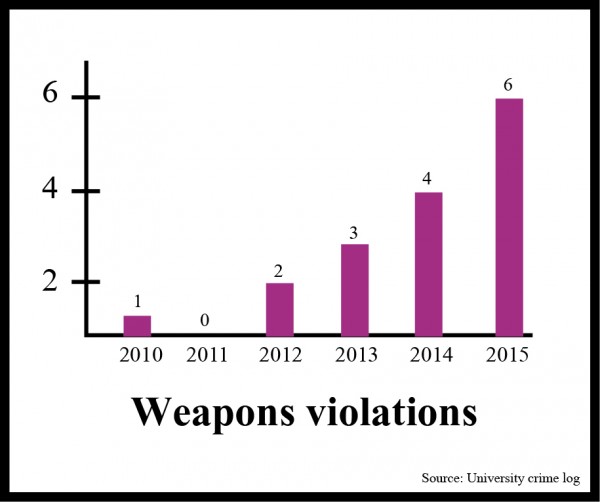There have been six weapons violations on campus so far this year, the highest number of violations in this time period for at least the last five years.
The violations this year to date represent a 50 percent increase from the four violations that were cited in all of 2014. The numbers have increased each year since 2011, when there were no violations, but officials said they haven’t noticed a trend in the number of weapons violations.
University Police Department Chief RaShall Brackney said weapons violations vary from year to year in both the number of violations and the type of weapons reported.
“We have not noticed a particular trend in weapons violations, nor have we instituted any changes to enforcement this year,” Brackney said.
GW defines a weapons violation as “the violation of laws on ordinances prohibiting the manufacture, sale, purchase, transportation, possession, concealment or use of firearms, cutting instruments, explosives, incendiary devices or other deadly weapons,” according to its annual security report.
A document on the Office of Student Rights and Responsibilities’ website lists more than a dozen items that are considered weapons, including BB guns, machetes, ammunition and Samurai swords.
Over the past few years, weapons violations have ranged from officials finding swords in the Marvin Center and Tasers in residence halls to students practicing martial arts with nunchucks.
There have been two weapons violations this month, including an incident where a student was referred for disciplinary action after a UPD officer caught him holding two knives when the officer was breaking up a party in South Hall on Halloween. In another incident, a male student referred for disciplinary action after UPD officers caught him trying to roll a joint on campus and he admitted to having a set of brass knuckles on him.
The week before, UPD assisted with an administrative search of the Phi Kappa Psi townhouse on 23rd Street, which led to officials finding a stun gun, cocaine residue, marijuana, drug paraphernalia and alcohol. GW is now investigating the chapter.
Police consultant Michael Levine said the numbers of violations could vary year to year because there is no way to really control students having “benign” weapons like brass knuckles on campus. He said one sign that GW’s enforcement of the ban may be working is that there have not been many incidents where weapons were used to harm someone else.
“It’s a fairly high-crime area,” Levine said. “Anything can happen.”







